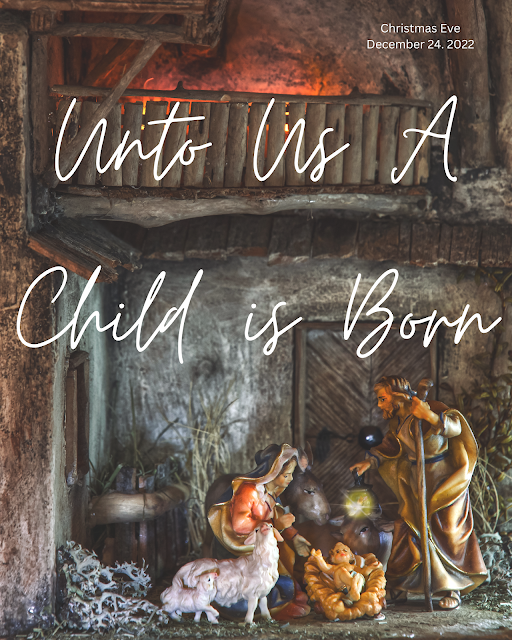Unto Us, A Child is Born! - Isaiah 9:2-7 (Christmas Eve A)
What are you looking forward to doing tonight? Hopefully, this is the highlight of Christmas Eve for most of you. I know it is for me. I am blessed to be worshipping and celebrating the birth of our Lord & Savior, Jesus Christ. After the service, my family and I will go to Tadj’s cousin’s house to visit with family we don’t see as often as I think we would like. We’ve packed the kids’ pajamas, so we know we’ll leave late. Those kids need to get into bed once we get home because you know who will stop by.
We’ve been preparing for weeks, and now here we are. I hope tonight lives up to all the ads which have been touting how you’re supposed to feel on Christmas. I hope you’re warm (especially tonight) and loving, even if your wallets are empty. Tonight is a night for peace and joy.
Several years ago, when Aaron was just a baby, we went through Franke Park for the light display. But we went on Christmas Day, at five o’clock, right after it got dark - or maybe it was seven. But we were the only car in the whole park. It’s hard to relax while ensuring the car stays on the road, but that’s one of my favorite holiday traditions. Sometimes, we can find a reminder of hope and faithfulness in the traditions.
Although I know for many of you, Christmas can be a painful season. Whatever you brought with you tonight, once you enter the doors of this sanctuary, you can leave it behind because what got you was this baby boy, Jesus, and the Holy Spirit. The good news is that God, our Creator, has decided to meet you in this manger tonight. Isn’t that powerful?
And as we read this passage, we see it is full of hope and promise. The people who were once walking in darkness have now seen a great light. They have been lifted out of their darkness and into the light of God’s love and grace. This light has multiplied their nation and increased their joy. It has broken the yoke of oppression and freed them from the burden of their oppressors.
From the first lines - “the people who have lived in a land of deep darkness” - other translations write it as “land in the shadow of death” - but what an image, especially if depression touches you or someone you love. But those in this land - a GREAT LIGHT has shined upon them. What did this mean for Isaiah? This is the story of the Assyrian conquest of the northern kingdom. Does that change this story for you? We can view it with a personal context - the personal sin we struggle with - but Isaiah may see it as corporate darkness - social evil, national tragedy, and corrupt social nets.
Then Isaiah looks at this great light as the dawning of a new age, looking past the battle before them. Wow - what a great image in our context with the state of our church, country, and world. The yoke has been thrown off, and the rod is broken. This child is bringing about a new way of life… for everyone!
What does that mean for you? Doesn’t that make you emotional? How do we long to be free of conflict? How long have we waited for our soldiers to come home without fear of being sent out? But these verses are not just about physical deliverance and freedom. It is also about the coming of a new king, a savior who will end the cycle of war and conflict. This child, born to us and given to us as a son, will be called the “Wonderful Counselor, Mighty God, Everlasting Father, Prince of Peace.” He will end the cycle of violence and establish a kingdom of peace and justice that will endure forever.
As much as we have this good news and are celebrating tonight, it seems appropriate to have bifocals on with this. We have one lens in reality: our world, with its brokenness and hopelessness. But there’s another where we can see God’s kingdom breaking down barriers, opening the doors so that God can bring the light in.
In the middle of this prophecy, the birth of the Messiah - sets off the coming of God’s Kingdom. It goes deeper with this child having titles that prepare those listening for the reign of God forever and foreverrrrrr….. who’s ready for Handel’s Messiah? I know I am - and this is the text it was based on.
We can also view this promise Isaiah gives with a shred of skepticism. How naive - “endless peace?” “Justice with righteousness”? How is God going to transform anything to get there? And this is the point where hope comes in with a baby boy - named Emmanuel.
To us, a child has been born; a son has been given - this points to the dual nature of Jesus - he was fully human (a child) and yet divine (the Son of God). Who better to announce this than an angel of the Lord, as we find in Luke?
But who receives this message - shepherds... SHEPHERDS! The guys at the bottom of the social structure - considered the lowest of the low, not even worthy of testifying in court - make their story much more important. God loves each one of us, even those who can share the story, but who will believe them? Not those in power. Maybe that’s been the struggle since this night thousands of years ago. And remember, it wasn’t just ONE angel - or one shepherd - the angels lit up the sky - just as Isaiah had promised. God is doing a new thing - bringing his divine work to his creation.
And - I know I just said this, and it’s easy to emphasize the shepherds' unworthiness, but you know what - strike that. God is the author of this story, and God finds them worthy because they are his creation. Not only that, but remember Psalm 23, how God is compared to a shepherd there, providing care and peace to the sheep they are in charge of. There is no mention in the Hebrew end of the Bible that these were despised people.
Regardless, it’s nighttime since it’s dark, as it is now... and if there’s something that shepherds would be good at - it’s watching and waiting. Their job is to protect and identify threats to their flock and themselves. If there’s going to be anyone to notice anything out of the ordinary, it’s a shepherd. And the way the story goes, it’s not like the angels took a wrong turn at the temple on the way to the halls of the powerful! This is the story God wants to tell, so we need to take all of that in when we interpret it.
It is striking that the story of the Nativity opens not with the glory of God but with that all-too-familiar, ugly reality. This time, Emperor Augustus is pulling the levers of power. He monetizes his authority by ensuring the highest tax grab possible. His decree requires that every single person, even the poorest of the poor, travel back to whatever God-forsaken place their family is from and register.
Mary and Joseph have to schlep 90 miles, and she is nine months pregnant. Such a safe and comfortable time to travel. To the middle of nowhere. To a town where all the rooms are full. Lucky them—Mary gets to give birth in a stable. The contrast between Emperor Augustus’s power and Joseph and Mary’s powerlessness could not be starker.
The contrast could not be more obvious. Messages like “Do not be afraid,” “Good news,” and “Great joy” are not what people are accustomed to hearing—especially when they never know what the emperor’s following missive might demand when they cannot predict when his army might descend on them; when they do not pretend to have security, safety, or sustenance.
And if the point were not clear enough, God brings it home when a host—an army—of angels swarm into the sky. “You think you’re in this alone?” God laughs. “Just try me.” No earthly power dares to compete with God’s glory.
Even then, mere promises are not enough. The shepherds go to Bethlehem to confirm what they have been told. The baby’s birth is just a sign of God’s promise to them, not the completion. So far, so good. As for Mary, even she still needs to “turn things over” in her heart.
“The contrast . . . between the angelic panoply and the earthly reality is sharp,” writes Luke Timothy Johnson in his Luke commentary. So much so that even Mary must ponder these things in her heart. There is no obvious evidence of God’s glory in the circumstances of Jesus’ birth. But when the news is bleak, and there is reason to count our faith as absurd, God’s faithfulness shows up in wonder and surprise.
I WILL BE forever grateful to Ada María Isasi-Díaz for her articulation of God’s reign as “kin-dom.” For many, the language of kinship has expanded our understanding of what God wants for humanity. It provides an essential framework for community and liberation. I also think the “kingdom” language of scripture isn’t quite finished with us. The messianic prophecies in the early chapters of Isaiah promise the people of Judah perpetuity through the birth of a new leader. Isaiah 9 says this child will inherit the throne of his ancestor David. One may recall a time in the history of God’s people when God warned against installing a king (1 Samuel 8:10-22). That’s not without reason; kings can be problematic. Yet, Judah’s fortunes will be restored when this child assumes the throne.
Jesus’ birth was heralded as a continuation of God’s kingdom through the hereditary lineage of David, though there was already a civil authority in place. The choice to appropriate the language of “kingdom” was deliberate precisely because the language is problematic—such appropriation to cast Jesus as a messiah and king shifts the connotation. Jesus’ “kingdom” challenges the conventions of other kingdoms. Jesus’ reign rejects elitism and rebuffs the fancy vestments to indicate social status. Jesus’ kingdom rejects rote adherence to the Law rather than mandating it. The seat of power in this kingdom is not in a palace or complex but in the heart of every person in Israel and the entire world! Even today, an empire built on righteousness and justice would be a new thing for many, as justice seems in short supply among earthly authorities. It, therefore, necessitates, as the psalmist says, “a new song” (Psalm 96:1). Christmas can be an opportunity for us to examine our investments in power structures and measure those investments against God’s desires for a king who comes in the most surprising of ways Share that as part of your Christmas greeting!
I started by asking what are you doing this Christmas Eve... I hope part of it, whether here in this space or when you get back home, is to give yourself some time to pray and to open your heart to the One who wants to love you - right as you are. God loves you because you are a creation of God. Nothing you can do or say can change that. Take some time tonight in silence (or not) and sit with that reality as you go out and share it with whomever you may be with tonight and in the days to come.
Amen.




Comments
Post a Comment